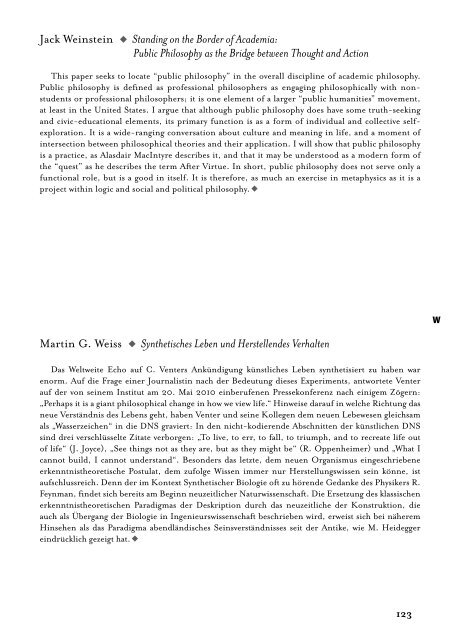Verlag.Buchhandel.Service. - Österreichische Gesellschaft für ...
Verlag.Buchhandel.Service. - Österreichische Gesellschaft für ...
Verlag.Buchhandel.Service. - Österreichische Gesellschaft für ...
Sie wollen auch ein ePaper? Erhöhen Sie die Reichweite Ihrer Titel.
YUMPU macht aus Druck-PDFs automatisch weboptimierte ePaper, die Google liebt.
Jack Weinstein ◆ Standing on the Border of Academia:<br />
Public Philosophy as the Bridge between Thought and Action<br />
This paper seeks to locate “public philosophy” in the overall discipline of academic philosophy.<br />
Public philosophy is defined as professional philosophers as engaging philosophically with nonstudents<br />
or professional philosophers; it is one element of a larger “public humanities” movement,<br />
at least in the United States. I argue that although public philosophy does have some truth-seeking<br />
and civic-educational elements, its primary function is as a form of individual and collective selfexploration.<br />
It is a wide-ranging conversation about culture and meaning in life, and a moment of<br />
intersection between philosophical theories and their application. I will show that public philosophy<br />
is a practice, as Alasdair MacIntyre describes it, and that it may be understood as a modern form of<br />
the “quest” as he describes the term After Virtue. In short, public philosophy does not serve only a<br />
functional role, but is a good in itself. It is therefore, as much an exercise in metaphysics as it is a<br />
project within logic and social and political philosophy. ◆<br />
Martin G. Weiss ◆ Synthetisches Leben und Herstellendes Verhalten<br />
Das Weltweite Echo auf C. Venters Ankündigung künstliches Leben synthetisiert zu haben war<br />
enorm. Auf die Frage einer Journalistin nach der Bedeutung dieses Experiments, antwortete Venter<br />
auf der von seinem Institut am 20. Mai 2010 einberufenen Pressekonferenz nach einigem Zögern:<br />
„Perhaps it is a giant philosophical change in how we view life.“ Hinweise darauf in welche Richtung das<br />
neue Verständnis des Lebens geht, haben Venter und seine Kollegen dem neuen Lebewesen gleichsam<br />
als „Wasserzeichen“ in die DNS graviert: In den nicht-kodierende Abschnitten der künstlichen DNS<br />
sind drei verschlüsselte Zitate verborgen: „To live, to err, to fall, to triumph, and to recreate life out<br />
of life“ (J. Joyce), „See things not as they are, but as they might be“ (R. Oppenheimer) und „What I<br />
cannot build, I cannot understand“. Besonders das letzte, dem neuen Organismus eingeschriebene<br />
erkenntnistheoretische Postulat, dem zufolge Wissen immer nur Herstellungswissen sein könne, ist<br />
aufschlussreich. Denn der im Kontext Synthetischer Biologie oft zu hörende Gedanke des Physikers R.<br />
Feynman, findet sich bereits am Beginn neuzeitlicher Naturwissenschaft. Die Ersetzung des klassischen<br />
erkenntnistheoretischen Paradigmas der Deskription durch das neuzeitliche der Konstruktion, die<br />
auch als Übergang der Biologie in Ingenieurswissenschaft beschrieben wird, erweist sich bei näherem<br />
Hinsehen als das Paradigma abendländisches Seinsverständnisses seit der Antike, wie M. Heidegger<br />
eindrücklich gezeigt hat. ◆<br />
123<br />
W


